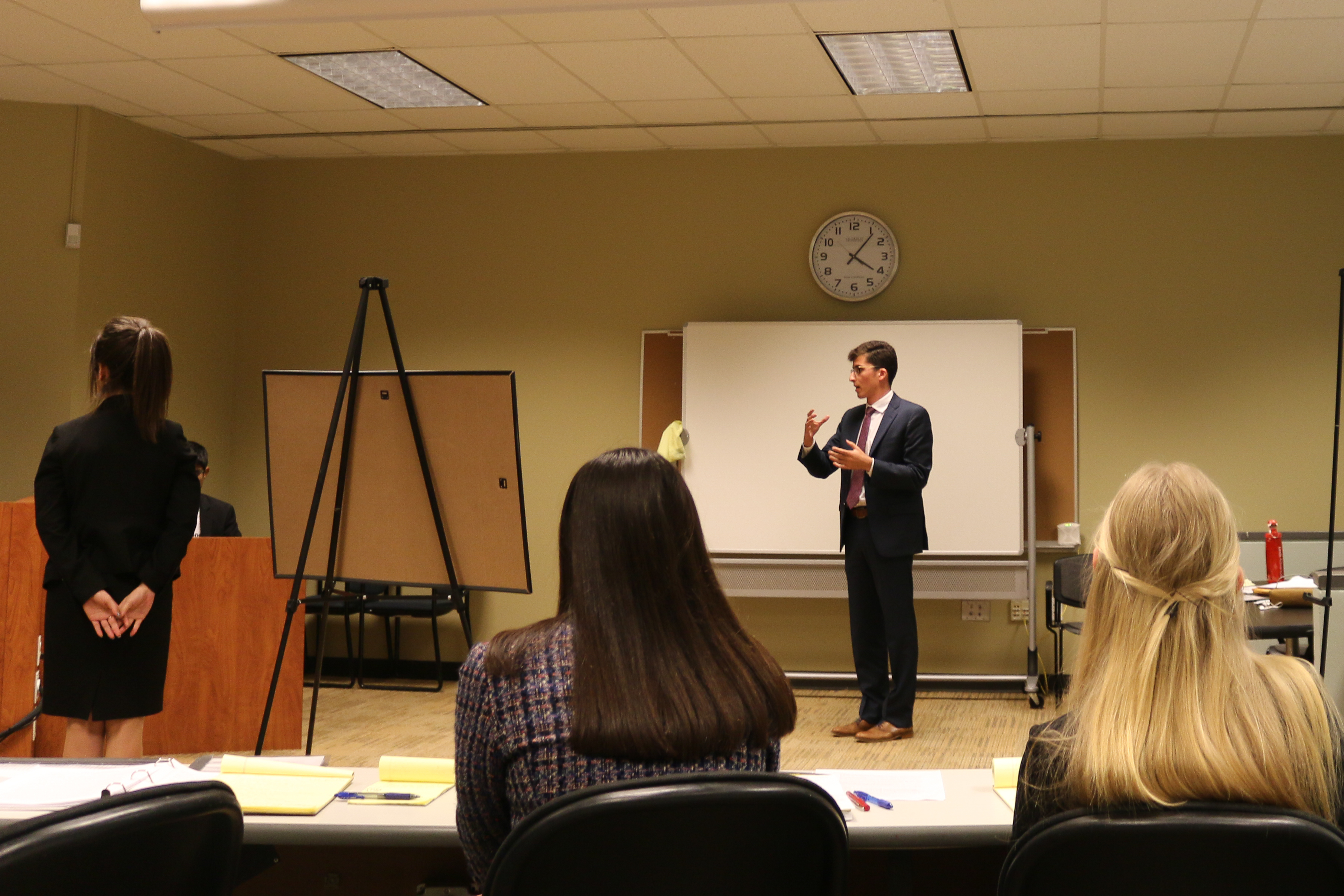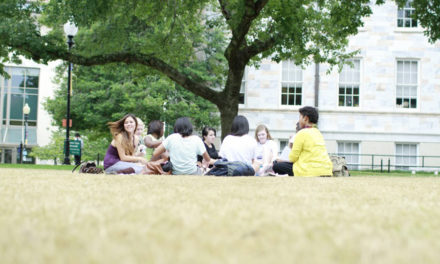
Greg Kimmerer/Contributing
The Georgia Institute of Technology and Emory University mock trial teams competed head-to-head in the final round of the Peach Bowl Invitational, which was hosted by Emory for the first time on Nov. 10. Collegiate teams from across the Southeast flocked to the Emory University School of Law for the inaugural mock trial tournament.
Carolyn Koehnke (19C), president of Emory’s Ben Pius Mock Trial team and co-director of the invitational, said the team had long been considering creating a tournament.
“There’s been a discussion on the team about wanting to run a tournament for the past couple of years, [but] this was the first year where we felt like we had a strong enough reputation in the mock trial community to make people want to come,” Koehnke said. “We are currently ranked 18th in the country, so we’ve been climbing for the past couple of years.”
Koehnke said that well-ranked teams find more success hosting tournaments because higher ranks suggest organizational capability to other teams. Koehnke also mentioned that she would like to see the tournament continue in future years, but that the decision depends on a vote by the Emory mock trial team.
Teams of six to 10 people consisting of undergraduate attorneys and witnesses competed in a total of four rounds throughout the tournament, with two rounds as the plaintiff and two as the defense. The case, titled Midlands Television Studios v. Danny Kosack, concerned a chimpanzee’s killing of a writer on the fictional show, “Midlands after Dark with Alex Grace.” The case tackled whose negligence, the chimpanzee’s trainer or the studio, led to the writer’s death.
Each year, all teams nationwide receive the same case, which they then research and prepare for the rest of the year. Though the Peach Bowl Invitational is a pre-season tournament, students will continue to argue Midlands v. Kosack at the National Championship Tournament at Elizabethtown College in April.
The competing schools included the University of Florida, Furman University (S.C.), Florida State University, Kennesaw State University (Ga.), Spelman College (Ga.), University of Central Florida, Southern Methodist University (Texas), Georgia State University (GSU), Elon University (N.C.) and University of North Carolina at Charlotte. Teams that are rated highly by judges go on to face similarly rated teams in the bracket.
The final round between Georgia Tech Team A and Emory started at 2 p.m. on Sunday and lasted three hours, with Emory representing Midlands Television, the plaintiff, and Georgia Tech representing chimpanzee trainer Danny Kosack, the defendant. Robert W. Smith Jr., the general counsel for the Prosecuting Attorneys’ Council of Georgia, acted as judge, while Jenny Lindsay of Jenny Lindsay and Associates acted as jury. Judges offered feedback to each team based on their opening and closing statements and the direct-examination and cross-examination of witnesses.
Witness testimonies enlivened the final round. Given the nature of the case at hand, the characters played by students were often eccentric. Robert Roundy (19C) played talk-show host Alex Grace, who wouldn’t have seemed out of place next to Jimmy Fallon, and Kaleolani Laymon (21C) portrayed self-absorbed Hollywood star AJ McClellen, an actor in who appeared as a guest on “Midlands.”
At one point, Laymon, playing McClellen, mentioned how she prepares for appearances by “reading through all my accomplishments and my resume [while looking] in the mirror … It takes about 45 minutes to finish [this routine].”
Although both Grace and McClellen were witnesses for the plaintiff, meaning they knew beforehand the questions that the Emory attorneys would ask, they also faced questions from the Georgia Tech team, whose goal was to get them to slip up and indicate negligence.
While Georgia Tech’s team consisted of seniors and fifth years, the Emory attorneys were almost all freshman and sophomores. In an email to the Wheel, Haley Rubin (22C) described the lengthy preparations that the team underwent for the tournament.
“During a typical week our team practices [three] days a week, but leading up to a tournament we practice every day,” Rubin wrote. “Normally, the week leading up to a tournament consists of practicing [four] hours a day.”
Rubin also expressed pride about her team’s ability to “hold their own” against the Georgia Tech All-American team, who have been recognized as one of the best teams in the nation.
Students at the closing ceremony seemed both itching to get home and anxious to hear to final results. The ceremony began late, eliciting boos, but the roaring cheers after each award announcement were far louder. The final results are based on the cumulative scores of all four rounds of competition. In the end Georgia Tech took home first place, GSU took second and Emory third. The Spirit of the American Mock Trial Association award, which recognizes “the team that best exemplifies its ideals — civility, justice and fair play” comprised a trophy cup filled with peaches, and went to Florida State University.
Tournament co-director Umar Kahn (19C) said the hardest part of planning was finding judges without relations to the students they would critique.
“So far, everyone has said it was an excellent, incredible tournament, and that they were so impressed that our first tournament [ran] better and smoother than [others] who [have run] their tournaments yearly for 10 or 15 years,” Kahn said.
Multiple students at the event corroborated Kahn’s positive assessment. Jessica Lorenzo, a freshman at the University of Florida, expressed approval.
“This tournament has been run very well so far,” Lorenzo said. “We’ve had great judges and … we’re constantly getting ideas from different teams and we’re giving ideas out to other teams.”
Though the first Peach Bowl Invitational has ended, Emory Mock Trial’s season is far from over. The team will compete on Dec. 1 and 2 at University of Alabama, Tuscaloosa. The season could last until April, if Emory again makes it to the national championships.




